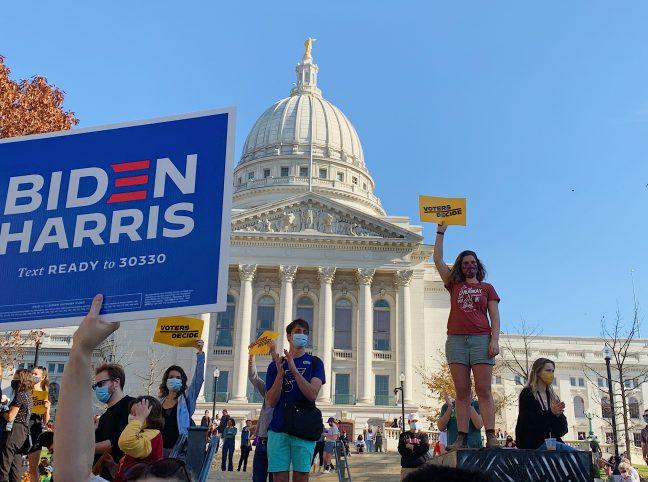Last week, President Biden delivered his first speech on U.S. foreign policy and described his main goals for the United States’ role in global affairs.
Biden’s main message was “America is back” on the world stage and “diplomacy is back at the center of our foreign policy.” While Biden’s emerging foreign policy agenda appears to borrow Trump’s successful isolationist approaches, his strategy reeks of Obama-era global interventionism and he seems subject to the blunders as his predecessors.
With a renewed interest in policing global affairs, Biden’s State Department sharply contrasts the Trump administration’s isolationist proclivities. In an interview with Wolf Blitzer —Biden’s Secretary of State — Antony J. Blinkin said it is in the U.S.’s best interests to actively engage in global affairs, suggesting if we don’t, chaos will ensue or another nation will take our leadership position.
Biden’s plans signal his similarities to Obama’s policies because of his initial ambition to micromanage world affairs in America’s favor. One of the first issues Biden addressed in his speech is the military coup in the Southeast Asian country of Myanmar (Burma), where he called on the usurping military government to relinquish its power in the name of democracy and refrain from violence.
He also stated he is placing economic sanctions on Myanmar and freezing about a billion dollars worth of their assets in the U.S.
Biden must address how “fake news” claims and media distrust continue to fuel Trump supporters
Overall, it’s a seemingly excessive devotion of attention to a country of normally fringe significance to U.S. interests and whose trade value with the U.S. is only in the millions of dollars. While Biden’s altruistic intentions of promoting democracy around the world are noble, his sanctions will likely do little to pressure the military out of power, instead pushing them closer to China’s influence and creating an even more troublesome economic crisis for the Burmese people.
Biden’s plan seems all too reminiscent of Obama’s eagerness to present a solution to almost every problem around the world. This same eagerness is what left the Obama administration overstretched and unprepared for crises of the most significance to American interests.
The president also signaled a return to Obama-era policy by focusing on strengthening U.S. alliances around the world. For the past four years, the Trump administration approached many foreign policy issues unilaterally. Trump also strained several U.S. friendships by making many demands, such as requesting more significant military commitments to NATO and money for his border wall.
Wisconsin Republican legislature pushes Trump’s agenda as COVID-19 cases rise statewide
Biden immediately changed this policy direction by keeping U.S. troops in Germany which had been scheduled to withdraw, reaffirming his commitment to NATO.
Biden also reaffirmed America’s commitment to supporting LGBTQ rights around the world, a stance Wisconsin Sen. Tammy Baldwin attempted to persuade the Trump administration to take for years.
Despite these dramatic shifts from the Trump era’s foreign policy, Biden appears to be continuing some Trump strategies, such as addressing America’s advisories more aggressively.
Biden expressed his willingness to continue Trump’s hard-line approach with China to address U.S. grievances, such as their illegal financial dealings, intellectual property theft, suppression of democracy in Hong Kong and ethnic cleansing of the Uyghur minority population.
UW students react to 2020 election results with joy, hope amid pandemic anxiety
Biden also expressed a desire to reinforce a hard-line approach with Russia and criticized Trump for not doing so. Many U.S. politicians, including Wisconsin Sen. Ron Johnson, have expressed concern about Russia’s interference in America’s elections. Biden hopes to fix Trump’s weakness to Russia and stated he will not “let Russia push us around.”
Biden specifically addressed his concern for the Russian government recently imprisoning their main opposition leader — Alexey Navalny — and demanded his release.
While our presidents continuously claimed to signal strength towards Russia, all administrations have acted the opposite. Obama failed to address Russian aggression in Ukraine and Crimea, where conflict continues today. Trump has notably done just as little to Russia, besides deporting some diplomats. With many Obama-era diplomats in Biden’s new administration, such as UW-Madison alumna Linda Thomas-Greenfield, fears of making similar mistakes loom at large.
In the Middle East, Biden also echoes Trump’s calls to end all unnecessary conflicts there. Biden announced the immediate end to U.S. offensive operations in Yemen — a conflict which started under Obama but dramatically worsened under Trump.
UW students must continue to historic rally against brutal detainment of Uighurs
Simultaneously, Biden reaffirmed his support of Saudi Arabia and defended U.S. allied interests against Iran. So, while Biden appears reminiscent of Trump in wanting to end all unnecessary foreign wars, he also appears similar to Obama in his willingness to involve the United States in Middle Eastern affairs.
Biden concluded his speech by reaffirming that “America can not afford to be absent on the world stage.”
His administration is making progress in reinstating America’s stature as the global superpower. By strengthening our alliances and taking a more active role in world affairs, Biden seems bound to improve U.S. diplomatic capabilities from those under Trump.
But Biden’s eagerness to respond to every global crisis signals a return to U.S. global interventions. Many Americans have expressed their distaste for this approach by electing Trump, who promised to prioritize “America First.” As the new world policeman, Biden must try to prevent making similar mistakes to his predecessors while not let U.S. power deteriorate from neglect or mismanagement.
Hayden Kolowrat ([email protected]) is a graduate student studying Southeast Asian studies.














